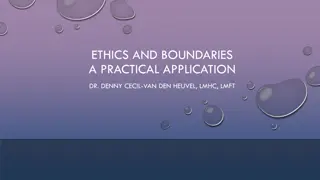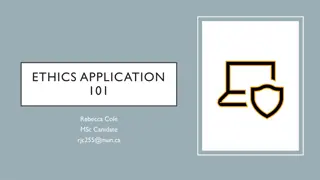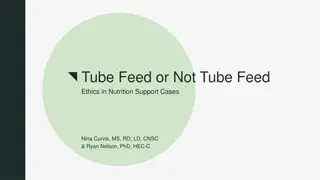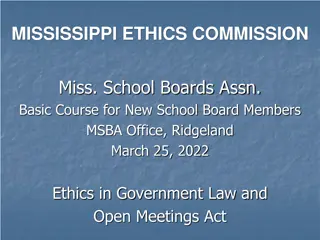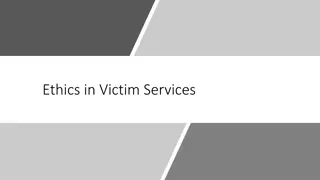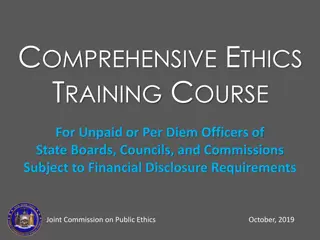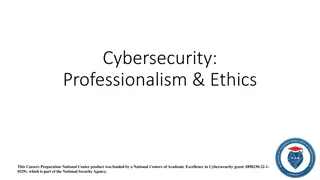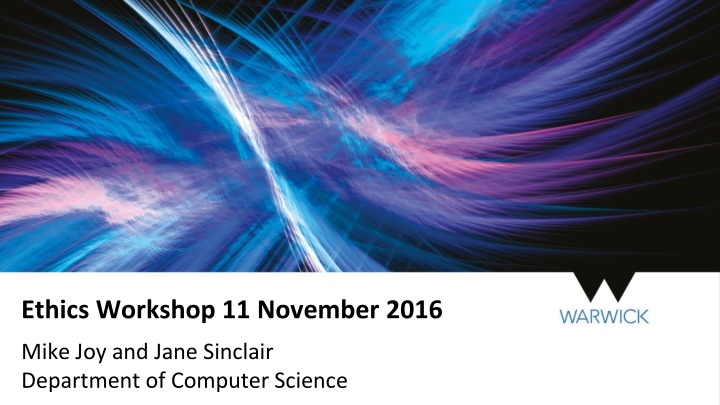
Exploring Ethics in University Research Workshops
Delve into the vital aspects of ethics in university research through workshops covering topics like moral theories, obtaining consent, ethical issues in technology, and more. Engage in discussions, group activities, and insightful presentations led by experts in the field.
Download Presentation

Please find below an Image/Link to download the presentation.
The content on the website is provided AS IS for your information and personal use only. It may not be sold, licensed, or shared on other websites without obtaining consent from the author. If you encounter any issues during the download, it is possible that the publisher has removed the file from their server.
You are allowed to download the files provided on this website for personal or commercial use, subject to the condition that they are used lawfully. All files are the property of their respective owners.
The content on the website is provided AS IS for your information and personal use only. It may not be sold, licensed, or shared on other websites without obtaining consent from the author.
E N D
Presentation Transcript
Ethics Workshop 11 November 2016 Mike Joy and Jane Sinclair Department of Computer Science
Agenda 09:30-9:45 09:45-10:45 10:45-11:00 11:00-11:15 11:15-11:35 11:35-12:00 12:00 Refreshments Research ethics theory and practice (Jane Sinclair and Mike Joy) Focus groups and coffee Ethics and online research (Mick Hammond) PlagiarWISe (Julie Robinson and Chris Bradford) Technical solutions and challenges (Mike Joy and Jane Sinclair) End 2 Ethics Workshop 11 November 2016
What is Ethics A quick look at the area and some of the main issues that affect universities Definitions of Ethics? Moral theories? Utilitarianism Deontology In the research context, practical doctrine of do no harm Any other viewpoints? 3 Ethics Workshop 11 November 2016
Issues affecting Ethics Issues affecting the use of learning technology more generally Do no harm Issues relating to wider staff/ student activity and ethical behaviour: e.g., fabricating data; plagiarism Research plan is viable, coherent and meaningful The context is learning and educational technologies: Participants understanding/having control Educational research issue of not disadvantaging any students Ethical issues of adaptive technology and targetted decisions? Any other issues? 4 Ethics Workshop 11 November 2016
Obtaining Consent What activities do we have to get consent for? Why is it vital to obtain consent? What is the university process? What are they looking for? The need for it to appear as valid research Convincing documentation balanced with the need to apply early Length of time for the process to complete (problem?) Trivial objections (problem?) Any other big issues? 5 Ethics Workshop 11 November 2016
Focus Groups Describe to each other your (current or a previous) project and outline the ethical issues involved with it. Tell your group about the process of applying for consent in the university as you experienced it Questions for feedback to the main group Are there any difficulties either in understanding what is required/what consent is needed in the current ethical consent process? Can you suggest ways to improve or streamline the university process? Do you think it is ethical to trial learning technology on one part of a group (randomised trials approach)? If not, how can we obtain evidence that it is having a positive effect? 6 Ethics Workshop 11 November 2016
Ethics and online research Mick Hammond Ethics Workshop 11 November 2016 7
Coffee Break 15 minutes please Ethics Workshop 11 November 2016 8
PlagiarWISe Julie Robinson and Chris Bradford 9 Ethics Workshop 11 November 2016
Technology and Ethics What technological solutions are there to ethical problems in our fields? How big is the plagiarism problem? What about source code plagiariasm? Does TurnitIn help or hinder? What ethical issues arise when the technology makes the decisions (eg: adaptation) 10 Ethics Workshop 11 November 2016

